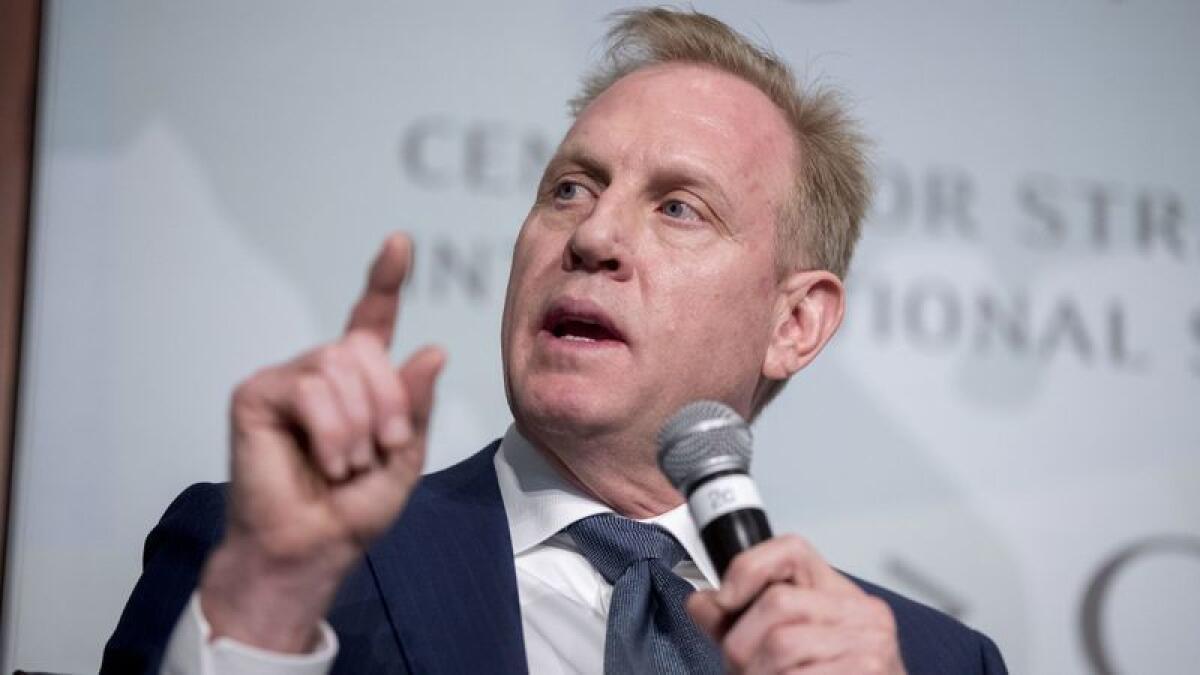Pentagon inspector general clears Shanahan in ethics inquiry

- Share via
Reporting from Washington — Acting Defense Secretary Patrick Shanahan, a former Boeing Co. executive, did not improperly promote the defense contractor or violate an ethics agreement requiring him to recuse himself from decisions affecting it, the Pentagon inspector general concluded in a report released Thursday.
Shanahan “routinely” mentioned Boeing in meetings with other Pentagon officials and at least once sharply criticized the F-35 fighter, which involved Boeing competitor Lockheed Martin Corp., according to the report.
Air Force Secretary Heather Wilson told investigators that she “felt uncomfortable” with Shanahan’s actions in several incidents involving Boeing.
But after reviewing these and other incidents, the inspector general concluded in a 43-page report that Shanahan “fully complied with his ethics agreements and his ethical obligations regarding Boeing.”
The finding eliminates a major hurdle for Shanahan, who took over at the Pentagon in an acting capacity after former Defense Secretary James N. Mattis resigned in December. President Trump has not nominated a permanent replacement, but could decide to choose Shanahan with the inspector general case resolved.
If nominated, Shanahan is likely to face questions from lawmakers about his career and whether he has the qualifications to run the Defense Department, the largest and most costly arm of the federal government. He spent 31 years at Boeing before Trump nominated him to be deputy Defense secretary in 2017.
Beyond his time as an aerospace industry executive, Shanahan has little experience with the military or as a strategic thinker, issues that some critics say should lead Trump to choose somebody else as his top civilian military advisor.
The investigation began in March after the inspector general office received what it called “similar allegations” about Shanahan from multiple sources, including an anonymous claim forwarded by a Senate Armed Services Committee staffer.
A month later, Sen. Elizabeth Warren (D-Mass.), a member of the Armed Services Committee, submitted related allegations, and several news reports described Shanahan praising Boeing’s business practices in meetings at the Pentagon.
Before the Senate confirmed Shanahan as deputy secretary in 2017, he promised to recuse himself from any decision affecting Boeing, which received $27.4 billion in Pentagon contracts in 2018, more than any other company except Lockheed.
Among the complaints to the inspector general were that Shanahan disparaged Lockheed.
Vice Admiral Mathias W. “Mat” Winter, the director of the F-35 program office, said that he had heard Shanahan say the warplane was a poor aircraft shortly after he arrived at the Pentagon.
“This is a couple of occasions and the first couple of meetings [with him]. I push back in that my team’s working hard … and then he says, ‘Well, it’s not just you. It’s Lockheed.’”
Other witnesses said Shanahan had justifiably criticized the F-35 program, which has been plagued by delays and cost overruns.
Pentagon officials and senior military officers told investigators that, in meetings, Shanahan frequently “noted his experience at Boeing when he was discussing how to drive down costs and increase performance from government contractors, but they did not take it as promoting Boeing.”
Despite Winter’s account, the inspector general concluded Shanahan did not make comments that “specifically disparaged Boeing’s competitor” and were aimed at “holding contractors accountable.”
Other witnesses recalled Shanahan cutting off conversations when Boeing came up, “demonstrating his intent to comply with his ethical obligations.”
The inspector general report dismissed allegations that Shanahan had “tried to force” the Marine Corps to buy Boeing F/A-18 fighters and threatened to cut the Air Force budget unless it bought Boeing F-15Xs.
“We concluded that, consistent with his ethical obligations, Mr. Shanahan only participated in broad policy obligations and not in very specific discussions about the quantities and types of aircraft” the Marines and Air Force would buy. In fact, Mattis “made the aircraft mix decision,” the report said.
Wilson, who has announced she is stepping down as Air Force secretary in May, was the Pentagon official who most directly disapproved of Shanahan.
She said he or his staff “had created the appearance of favoritism” toward Boeing by telling Ellen M. Lord, the undersecretary of Defense for acquisition, to convene a meeting on whether the Air Force would agree to accept delivery of the Boeing-made KC-46 aerial refueling tanker, despite technical problems with the aircraft.
Wilson told investigators that Lord supported not fixing the problems until after the Air Force accepted delivery, a formal milestone that would result in substantial payments to Boeing.
But the inspector general concluded that Shanahan “had no involvement” in the Air Force decision to accept the aircraft, noting that his staff had involved Lord in order to keep him out of deliberations.
Wilson also criticized Shanahan for a December 2018 meeting with Elon Musk, the chief executive of SpaceX, a competitor with Boeing for rocket launch services.
Wilson said she told Shanahan he “probably need[ed] to recuse himself from the meeting” because the Air Force had just picked Boeing over SpaceX for a launch contract.
Shanahan’s staff had already gotten approval from Pentagon ethics lawyers to attend the meeting. Musk mentioned the contract at the meeting, according to notes from a participant, noting that SpaceX “had written a poor proposal.” The notes did not reflect Shanahan saying anything.
More stories from David S. Cloud »
More to Read
Get the L.A. Times Politics newsletter
Deeply reported insights into legislation, politics and policy from Sacramento, Washington and beyond. In your inbox twice per week.
You may occasionally receive promotional content from the Los Angeles Times.











